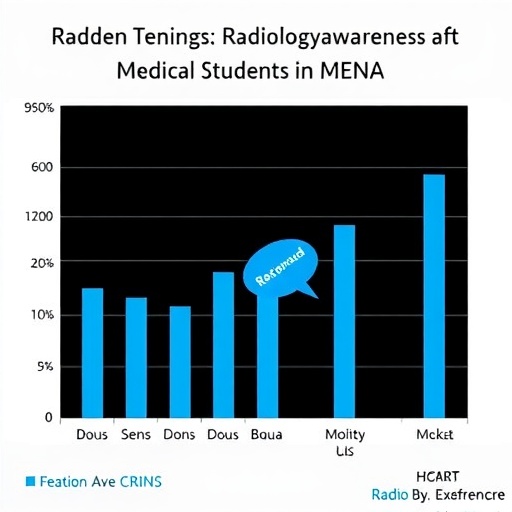In recent years, the global medical education landscape has faced numerous challenges, particularly in the field of radiology. A transformative multicenter cross-sectional study conducted across Egypt, Libya, and Yemen has shed light on the knowledge and career interests of medical students within this vital discipline. Published in “BMC Medical Education,” the findings of the study have significant implications for the future of medical training and healthcare delivery in these regions, drawing attention to the evolving dynamics of student interests and professional aspirations.
Radiology, as a cornerstone of modern medicine, relies heavily on advanced imaging technology to aid in diagnosis and treatment planning. However, the understanding and appreciation of this specialty among medical students in the Middle East often varies greatly, depending on several factors including curriculum design, exposure to the field, and access to clinical training. This study aimed to explore the levels of radiology knowledge and the degree of interest among medical students, providing essential data that could inform curriculum development and faculty training programs in the region.
The researchers deployed a robust methodology, gathering data from multiple medical institutions across the three countries. By using structured questionnaires designed to assess radiology knowledge and career interest, the researchers ensured a comprehensive and systematic approach. Given the diversity of medical training environments and healthcare systems in these countries, the multicenter design allowed for a rich comparative analysis that highlights both common trends and specific regional concerns.
Findings from this study revealed a notable gap in radiology knowledge among medical students, which varied significantly based on the year of study and institutional affiliation. While students from certain universities displayed a commendable understanding of key radiological concepts, others demonstrated alarming deficiencies that could hinder their competency in future medical practice. This discrepancy raises important questions about the adequacy of existing educational frameworks and the resources allocated to ensure a solid grounding in radiological sciences.
In examining career interests, the study found an intriguing trend: many medical students expressed a keen interest in pursuing a career in radiology. This was particularly evident among students who had been exposed to clinical rotations in radiological departments, which underscored the importance of real-world experience in shaping career aspirations. However, despite this interest, barriers such as lack of mentorship, insufficient exposure during training, and the perception of radiology as a niche specialty emerged as deterrents impacting the students’ career choices.
Moreover, the study revealed a concerning issue related to the perception of radiology within the broader medical community. Many respondents reported that radiology was often overshadowed by other more visible specialties, leading to a lower prioritization of radiological education. This perception not only affects student interest but could also influence the future workforce in radiology, particularly in regions where healthcare systems are already stretched thin.
As the landscape of healthcare continues to evolve, particularly in areas dramatically impacted by conflict and economic instability, the need for competent radiologists has never been more pressing. Radiology plays a critical role in early diagnosis and intervention, significantly enhancing patient outcomes. As such, addressing the educational gaps identified in this study is not only essential for the professional development of medical students but is also vital for the overall enhancement of healthcare quality in Egypt, Libya, and Yemen.
The implications of the study extend beyond mere academic interest; they lay the groundwork for urgently needed reforms in medical education. Stakeholders, including policymakers and educational institutions, must collaborate to devise strategies that enhance the radiological training components of medical curricula. These strategies could encompass increased funding for radiology programs, improved access to imaging technology for students, and the establishment of mentorship networks to support budding radiologists.
Additionally, as the demand for radiologists grows globally, innovative teaching methodologies such as problem-based learning, simulations, and digital platforms could be leveraged to foster greater engagement and knowledge retention among students. By integrating modern pedagogical approaches and ensuring exposure to advanced imaging modalities, educators can significantly enhance radiological training.
In conclusion, the multicenter cross-sectional study conducted by Kashbour et al. serves as a clarion call to action for medical educators, institutions, and policymakers alike. It is imperative to bridge the existing gaps in radiology knowledge and to enhance the career trajectories of medical students in Egypt, Libya, and Yemen. By fostering a culture of engagement and excellence in radiology education, the region can cultivate a new generation of proficient radiologists, vastly improving healthcare delivery in this part of the world.
As the findings continue to resonate within academic and healthcare circles, it is hoped that this pivotal research will stimulate ongoing dialogue and prompt action to better align medical education with the evolving needs of society. The journey toward a more knowledgeable and interest-driven cohort of medical professionals begins now, driven by the insights gleaned from this significant study.
Subject of Research: Knowledge and career interest in radiology among medical students in Egypt, Libya, and Yemen.
Article Title: Radiology knowledge and career interest among medical students in Egypt, Libya, and Yemen: a multicenter cross-sectional study.
Article References:
Kashbour, M., Dabssi, O.A., Abdelaziz, M.A.Y. et al. Radiology knowledge and career interest among medical students in Egypt, Libya, and Yemen: a multicenter cross-sectional study.
BMC Med Educ 25, 1536 (2025). https://doi.org/10.1186/s12909-025-08110-w
Image Credits: AI Generated
DOI: https://doi.org/10.1186/s12909-025-08110-w
Keywords: Radiology, medical education, medical students, Egypt, Libya, Yemen, career interest, knowledge assessment.




